April 3, 2025 | 21:03 GMT +7
April 3, 2025 | 21:03 GMT +7
Hotline: 0913.378.918
April 3, 2025 | 21:03 GMT +7
Hotline: 0913.378.918
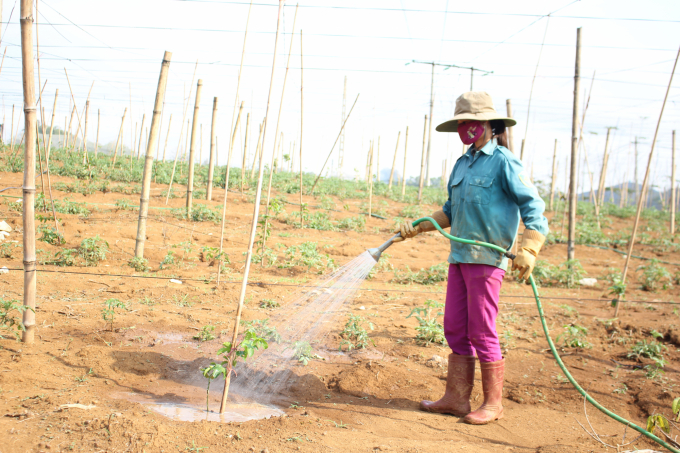
The business - cooperative - farmers fruit tree production link chain still has many unresolved problems. Photo: Trung Quan.
Northwest Nafoods Joint Stock Company, in association with local farmers, planted the first passion fruit trees in Son La in 2017. Passion fruit growing cooperatives were established in turn, attracting the participation of hundreds of farmers. Northwest Nafoods is responsible for surveying the planting area, training and monitoring technology transfer, providing seeds and readily underwriting 100% of the product at a committed price so that it would not be a loss for farmers.
Despite the belief that farmers had had a sustainable way out of poverty for themselves, the tragedy began when passion fruit merchants appeared. They scoured the villages, picked the most beautiful passion fruit and bought it at the highest price. While the price offered by Nafoods Northwest was stable at VND 15,000 - 17,000/kg, traders pushed them up to more than VND 25,000/kg for grade A fruit, then raised to over VND 30,000/kg, then over VND 35,000/kg.
At first, Northwest Nafoods also raised prices for cooperatives following the price increase of the free market, but when the company raised one price level, the traders raised it 2 - 3 times higher. Just like that, the price of passion fruit in Son La became an unruly horse.
Unable to keep up with the skyrocketing free market price, add with the situation when the quantity of quality raw passion fruits is at a constant loss, Northwest Nafoods was forced to cancel the contract with many cooperatives at the beginning of 2019.
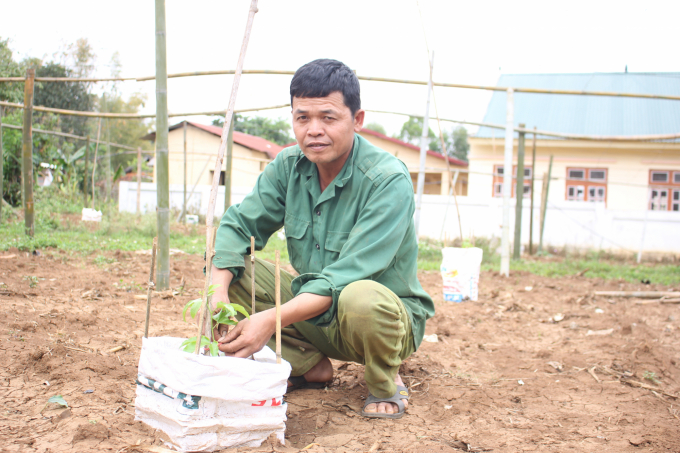
Farmers were prone to looking for uncertified passion fruit seed sources that lack methodical production procedures, leading to constant threats to production. Photo: Trung Quan.
According to Mr. Mai Van Quang, Deputy Director of Nafood Northwest, the current link between the company, the cooperative, and farmers can be considered "floating" along the free market, not to mention the over-purchase and competition of traders even in the raw material area established by Nafood Northwest. This creates a mentality in people that they have many channels of consumption, so they will sell to whoever pays a higher price, “every man for himself”, which makes the link even more unstable.
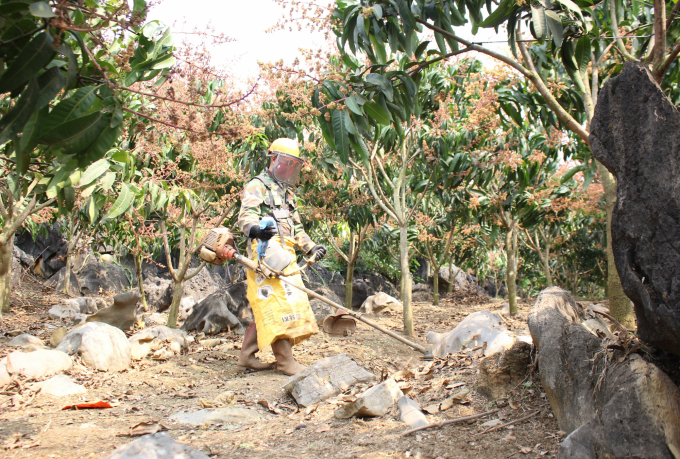
Not only passion fruit growers, but mango growers also expressed their disliking to join the link for fear of being bound by many factors. Photo: Trung Quan.
The cooperative holds an extremely important role in the production link chain, both as a direct subject of production and trading, market searching and product distributing, and as a bridge between businesses and households. However, in reality, cooperatives also have to face many problems.
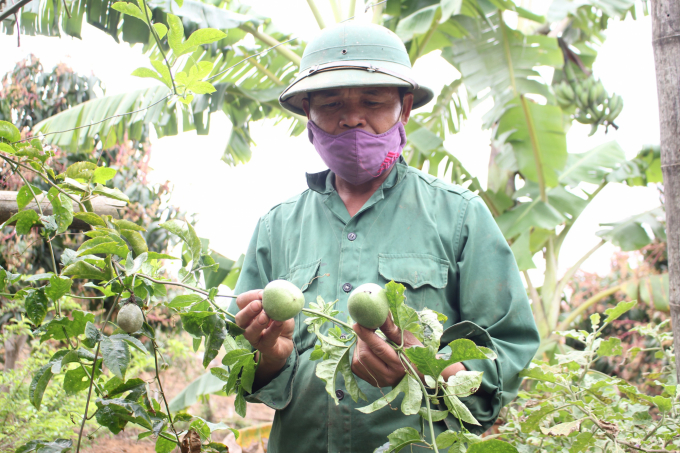
Many cooperatives that grow passion fruit in Son La "part ways" with the production link chain due to an immense amount of pressure they have to face. Photo: Trung Quan.
Mr. Lo Van Tien, Director of Thanh Dat Cooperative, Chieng Luong Commune (Mai Son District, Son La) shared, “The cooperative planted more than 60 ha of passion fruit with Nafoods Northwest in the past, but now this link has been put on pause. The cooperative was "reluctant" to continue to act as the focal point.”
So, the cooperative stands out as the focal point, a legal representative to sign the contract to ensure the sufficient amount of raw material supply with the company according to the agreement, while the locals run after the imminent profit, breaking the agreement and selling the products out themselves. The cooperative suddenly fell into a "dilemma", while it was very difficult to apply sanctions because of many influencing factors.
The family of Mr. Luong Van Inh, Chieng Den village, Chieng Chan commune, Mai Son (Son La) has been involved in growing passion fruit since the early days. He has this impression on businesses that companies often select A-grade products very strictly, and processed fruits are also purchased at prices than lower outside traders.
Meanwhile, the disease on passion fruit cannot be treated, the yield and fruit design are not up to expectations, so for Mr. Inh, companies choosing product too carefully is a big disadvantage for growers. “Traders buy in big quantity, they choose not too carefully, so of course we prefer the option of free selling."
Translated by Samuel Pham
![Sustainable future for wood industry: [Part 3] Green transformation](https://t.ex-cdn.com/nongnghiep.vn/608w/files/doanhtq/2025/04/01/2558-2129-4jpg-nongnghiep-162120.jpg)
(VAN) One of the solutions for Vietnam's timber industry to achieve sustainable development amid the current challenges is to undergo a green transformation…
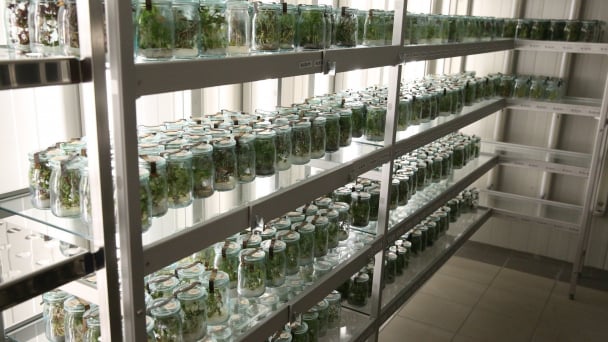
(VAN) Empowering farmers, Indigenous Peoples, local communities and scientists to conserve and use genetic resources is key to resilient agrifood systems.
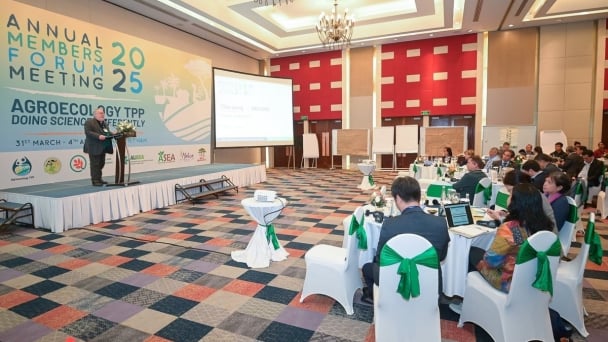
(VAN) Mr. Nguyen Do Anh Tuan, Director of the International Cooperation Department (Ministry of Agriculture and Environment), affirmed that ecological agriculture is a solution for many challenges in the current period.
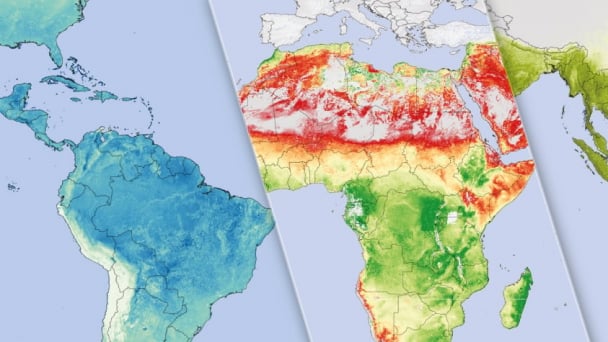
(VAN) The project ‘Drought impact assessment in the Central Highlands’ will leverage remote sensing technology to forecast drought for about 1,500 square kilometers of agricultural production areas.

(VAN) The World Bank (WB) will accompany the Ministry of Agriculture and Environment in implementing sustainable fisheries infrastructure development and ensuring livelihoods projects.
![Sustainable future for wood industry: [Part 2] Businesses concern about tax policies](https://t.ex-cdn.com/nongnghiep.vn/608w/files/huytd/2025/03/28/2517-4-160407_111-092943.jpg)
(VAN) In addition to the challenges posed by the EUDR, Vietnam's wood industry is also facing tax policies from the United States, one of its major markets.
![Sustainable future for wood industry: [Part 1] Identifying challenges](https://t.ex-cdn.com/nongnghiep.vn/608w/files/tungvd/2025/03/16/5915-4jpg-nongnghiep-155905.jpg)
(VAN) With the European Union Deforestation Regulation (EUDR) and fluctuations in the global market, Vietnam's wood industry will face numerous challenges in the coming years that must be overcome...